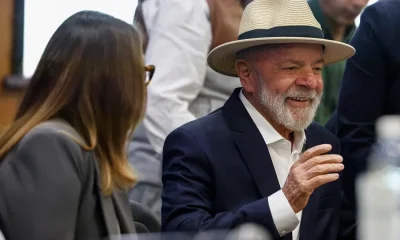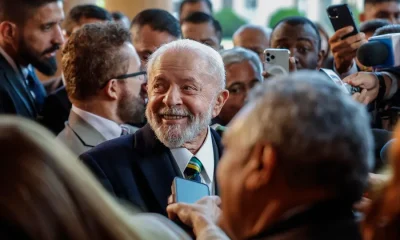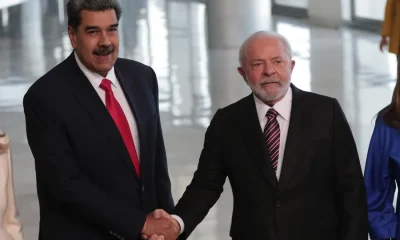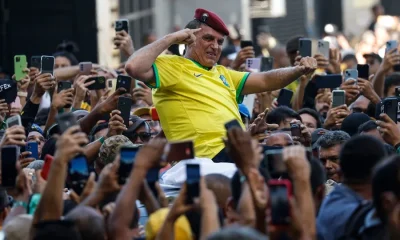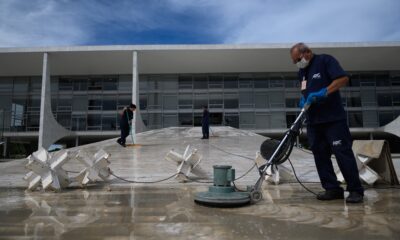International
Lula slams far-right ‘terrorism’ as Brazil clears protest camps
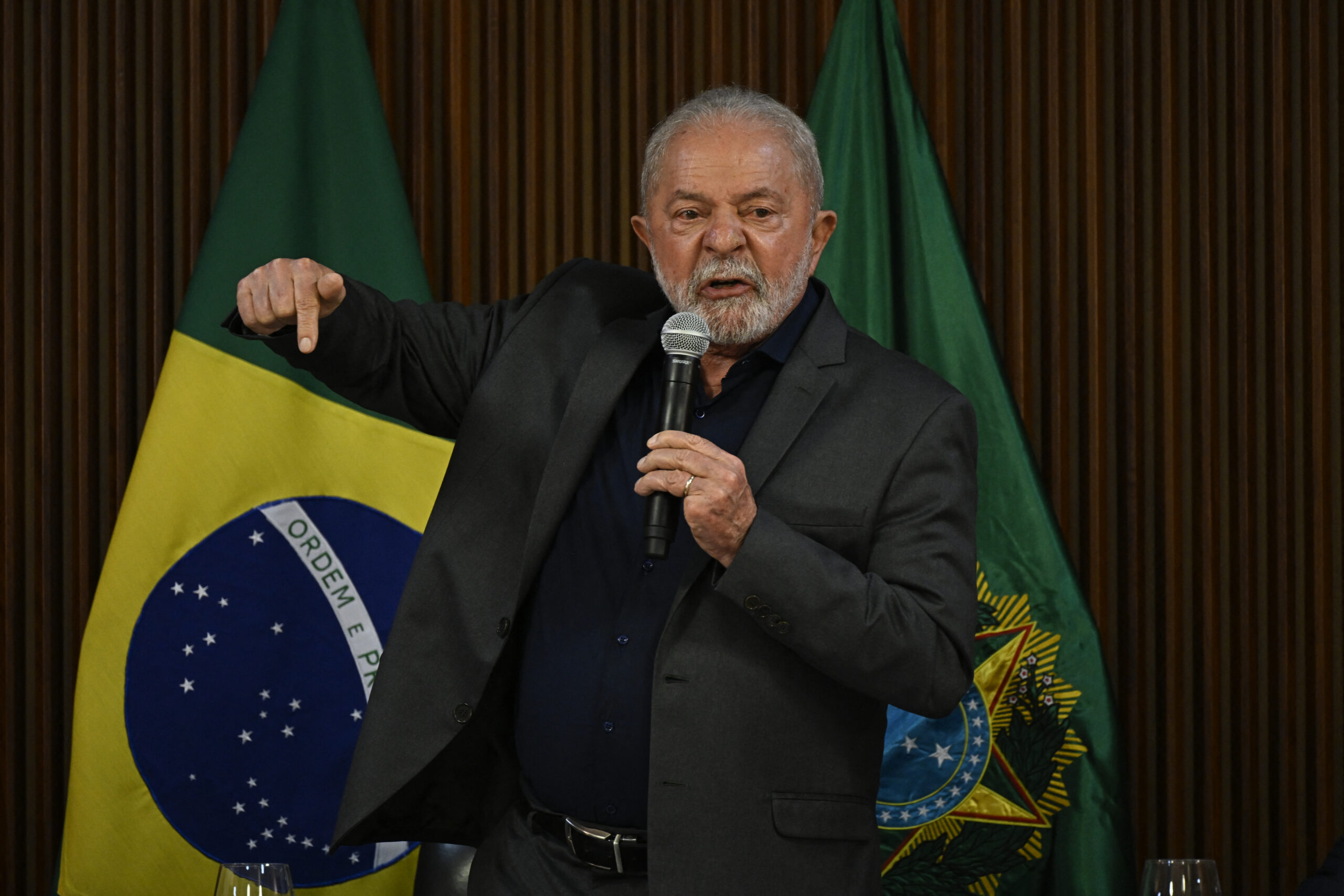
January 10 | By AFP | Ramon Sahmkow|
Brazilian security forces cleared protest camps Monday and arrested 1,500 people as President Luiz Inacio Lula da Silva condemned “acts of terrorism” after a far-right mob stormed the seat of power, unleashing chaos on the capital.
Hundreds of soldiers and police mobilized to dismantle an improvised camp outside the army’s headquarters in Brasilia.
There, some 3,000 supporters of ex-president Jair Bolsonaro had set up tents — used as a base for the sea of protesters who ran riot inside the presidential palace, Congress and Supreme Court for around four hours Sunday.
Lula, who took office on January 1 after a bitterly divisive election win over Bolsonaro, returned to work in the pillaged presidential palace, where AFP reporters saw the wreckage that remained of the previous day’s havoc: trashed artwork and offices, shattered windows and doors, broken glass strewn across the floor, and furniture dragged into a reflecting pool.
Lula, the 77-year-old veteran leftist who previously led Brazil from 2003 to 2010, met with the leaders of both houses of Congress and the chief justice of the Supreme Court, and joined them in condemning what many called the South American country’s version of the US Capitol riots in Washington two years ago.
“The three powers of the republic, the defenders of democracy and the constitution, reject the terrorist acts and criminal, coup-mongering vandalism that occurred,” they said in a joint statement.
Lula accepted an invitation to meet with President Joe Biden next month in Washington, US officials said.
Bolsonaro, who narrowly lost the October elections, meanwhile said on Twitter that he had been hospitalized in Florida with abdominal pains stemming from a near-fatal knife attack when he was campaigning for the presidency in 2018.
Bolsonaro has alleged he is the victim of a conspiracy against him by Brazil’s courts and electoral authorities.
The ex-president, dubbed the “Tropical Trump,” traveled to Orlando on the second-to-last day of his term — snubbing Lula’s inauguration, in a break with tradition.
Bolsonaro, 67, took to Twitter Sunday night to condemn the “pillaging” in Brasilia, but rejected Lula’s claim he incited the attacks, and defended the right to “peaceful protests.”
‘Traces of Trumpism’
As the nation continued to come to grips with Sunday’s stunning violence, hundreds of people gathered along a major avenue in downtown Sao Paulo to defend Brazilian democracy and demand punishment for the people who stormed the halls of power a day earlier.
“I have not endured what I have in this life to see what I saw yesterday — my people, my country, divided in such a way,” said Edi Valladares, a 61 year old teacher.
The demonstrators included young people, entire families, labor union activists, anti-racism advocates and others, with banners reading “We are with Lula and for democracy” and “Respect for the people’s vote.”
Earlier in the day, large contingents of riot police deployed to lock down the capital’s Three Powers Square, home to the iconic modernist buildings that serve as the headquarters of the three branches of government.
Condemnation continued to pour in from around the world, with Pope Francis criticizing the unrest as a sign of “weakening of democracy” in the Americas.
In a joint statement ahead of summit talks in Mexico City, Biden, Mexican President Andres Manuel Lopez Obrador and Canadian Prime Minister Justin Trudeau condemned the attacks and said they “stand with Brazil as it safeguards its democratic institutions.”
In a show of firm support, Biden spoke with Lula by phone Monday and invited him to visit the White House in early February. The Brazilian leader accepted, the White House said.
Biden told Lula of his support for “the free will of the Brazilian people as expressed in Brazil’s recent presidential election, which President Lula won,” the White House said in a statement.
Many drew the inevitable comparison to January 6, 2021, when supporters of then-US president Donald Trump invaded the Capitol in Washington in a violent, failed bid to stop Congress from certifying his election loss.
Investigation begins
Lula, who was in the southeastern city of Araraquara visiting a flood-hit region when the riot started, signed a decree Sunday declaring a federal intervention in Brasilia, giving his government special powers over the local police force to restore law and order in the capital.
His government vowed to find and arrest those who planned and financed the attacks.
Supreme Court Justice Alexandre de Moraes suspended Brasilia Governor Ibaneis Rocha, a Bolsonaro ally, from his post for 90 days, on grounds of “criminal negligence.”
Moraes also ordered the security forces to disperse anti-government protests outside military bases nationwide.
Hardline Bolsonaro supporters have been protesting outside army barracks calling for a military intervention to keep Lula from power since his election win.
Following the ruling, soldiers and police broke up camps in Rio de Janeiro and Sao Paulo, as well as Brasilia.
Lula narrowly won the October 30 runoff election by a score of 50.9 percent to 49.1 percent.
International
Claudia Sheinbaum: Operation Against ‘El Mencho’ Was Based on Pending Arrest Warrants

Mexico’s President Claudia Sheinbaum on Wednesday rejected claims that the military operation that resulted in the death of Nemesio Oseguera Cervantes, known as “El Mencho,” leader of the Jalisco New Generation Cartel (CJNG), was carried out under pressure from the United States government.
Sheinbaum explained that the deployment of federal forces was aimed at executing outstanding arrest warrants against Oseguera Cervantes, who was considered one of the most wanted criminals in both Mexico and the United States.
“That was not the objective (to ease pressure from the United States). It is very important, and I want to repeat it. This individual had an arrest warrant, or several,” Sheinbaum said, referring to the operation conducted on February 22.
According to the president, the initial goal was to capture Oseguera Cervantes, but military forces responded after coming under attack during the intervention.
“The operation was to detain him. The problem is that they were attacked — the Secretariat of National Defense — and they responded at that moment,” she said.
The president insisted that the action was not carried out in response to external demands, although she acknowledged intelligence cooperation with the United States.
“It was not done in any way because of pressure from the United States, not at all. Of course, there was intelligence information from the United States that was used specifically,” she concluded.
International
Spain Denies Any Agreement to Cooperate with U.S. Military in Iran Operations
International
White House Says Spain Agrees to Cooperate with U.S. Military After Trump Threatens Trade Embargo

White House Press Secretary Karoline Leavitt said Wednesday that Spain has agreed “in recent hours” to cooperate with the U.S. military, following President Donald Trump’s threat to impose a trade embargo on Madrid.
Trump had warned of potential commercial measures after Spain reportedly refused to allow the Pentagon to use facilities at Spanish military bases for operations related to Iran.
“With respect to Spain, I think you heard the president’s message yesterday loud and clear, and I understand that in recent hours they have agreed to cooperate with the United States military,” Leavitt said during a press briefing.
She added that the U.S. military is currently coordinating with its counterparts in Spain. However, the president expects broader support.
“The president expects that all of Europe, all of our European allies, of course, will cooperate in this important mission — not only for the United States, but also for Europe,” Leavitt said.
Her remarks came in response to questions about Spain’s position and its role as a U.S. ally amid rising tensions surrounding operations involving Iran.
-

 International4 days ago
International4 days agoIran Reports 201 Dead, 747 Injured After U.S. and Israeli Strikes
-

 International3 days ago
International3 days agoBrazil’s Supreme Court Rejects Bolsonaro’s Bid for House Arrest
-

 International3 days ago
International3 days agoAnti-ICE Billboard Campaign Targets Immigration Spending in 31 U.S. Cities
-

 International2 days ago
International2 days agoSpain’s Prime Minister to Address Nation Amid Trump’s Trade Threats
-

 International4 days ago
International4 days agoPope Leo XIV Urges End to ‘Spiral of Violence’ in Middle East
-

 Sin categoría5 days ago
Sin categoría5 days agoTrump: ‘We Think It’s True’ Amid Claims Iran’s Supreme Leader Was Killed
-

 International5 days ago
International5 days agoSecurity Council to Hold Emergency Meeting on Middle East Crisis
-

 International3 days ago
International3 days agoTrump Warns of ‘Major Wave’ of Attacks as Iran Conflict Escalates
-

 International21 hours ago
International21 hours agoWhite House Says Spain Agrees to Cooperate with U.S. Military After Trump Threatens Trade Embargo
-

 International3 days ago
International3 days agoMexico Calls for Immediate Probe After National Dies in ICE Custody
-

 International2 days ago
International2 days agoNew York Announces First 2,000 Seats in Universal 2-K Program
-

 International21 hours ago
International21 hours agoSpain Denies Any Agreement to Cooperate with U.S. Military in Iran Operations
-

 Central America21 hours ago
Central America21 hours agoNicaragua Held Responsible for Harassment of Opposition Prosecutor and His Family
-

 International3 days ago
International3 days agoBolivia Orders Three Investigations Into Deadly Military Plane Crash
-

 International2 days ago
International2 days agoWarner Bros. Developing First ‘Game of Thrones’ Movie With ‘Andor’ Writer
-

 Central America3 days ago
Central America3 days agoPanama Canal Monitoring Trade as Middle East Conflict Disrupts Shipping
-

 Central America2 days ago
Central America2 days agoGuatemala’s Attorney General Fails in Bid for Top Court Seat Amid Corruption Allegations
-

 International21 hours ago
International21 hours agoClaudia Sheinbaum: Operation Against ‘El Mencho’ Was Based on Pending Arrest Warrants































